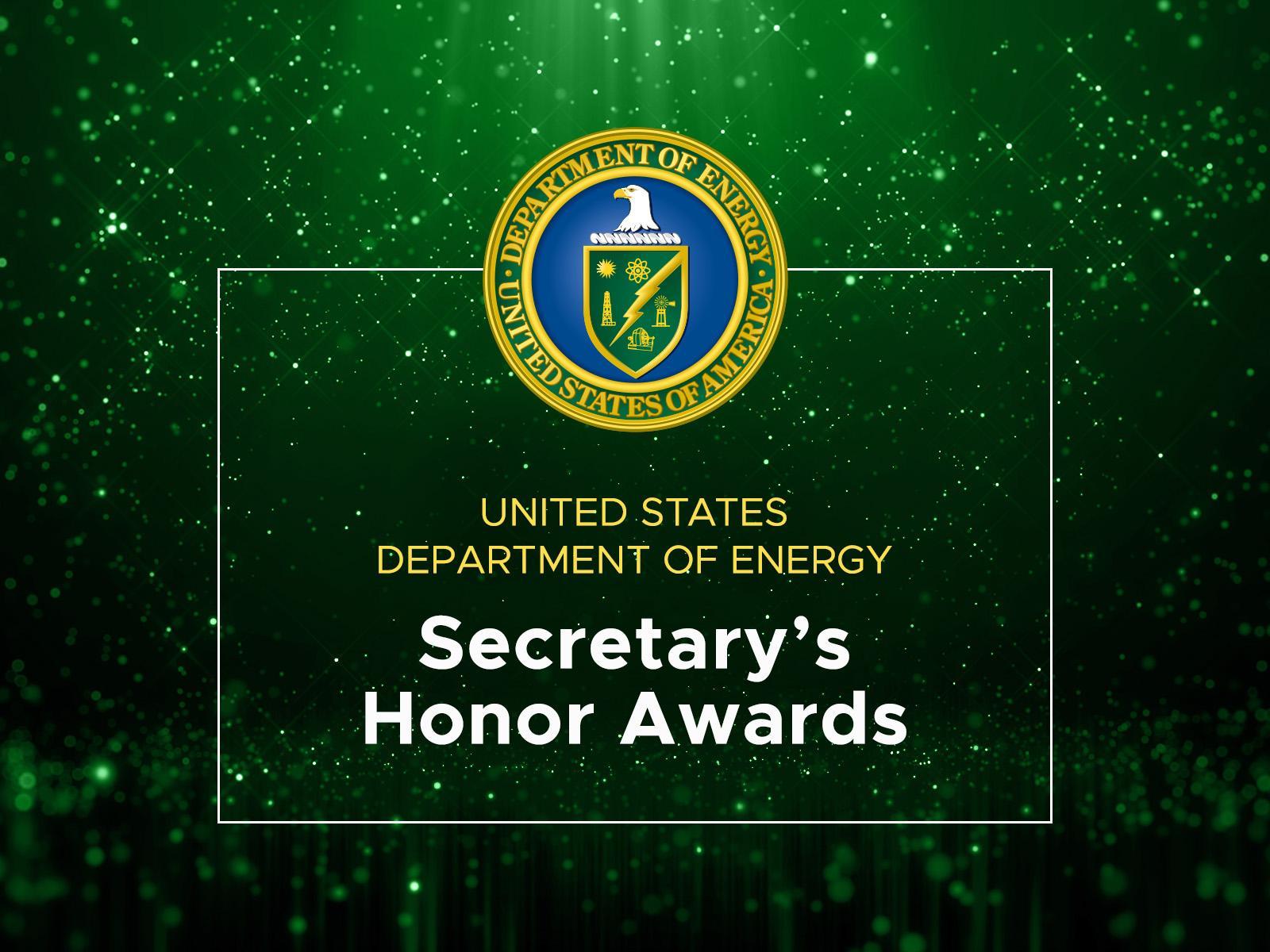PNNL Staff Recognized with Secretary's Honor Award
PNNL staff contribute to mission-critical projects—from grid modernization to nuclear fuel, assistance to Ukraine, and Puerto Rico

Image: U.S. Department of Energy
On February 20, Department of Energy (DOE) presented six teams from Pacific Northwest National Laboratory (PNNL) with the Secretary's Honor Award for their work solving some of the most pressing challenges in energy, national security, and grid modernization. This award recognizes federal and contractor employees for service and contributions to DOE's mission and for their creativity, drive, and commitment to projects that have significant and lasting impacts on the nation. This year, the DOE honored 53 teams with the Secretary of Energy Achievement Award. The following award-winning teams included staff members from PNNL.
Nuclear Fuel Data Survey (GC-859) Web Application Development
The GC-859 Web Application Development Team modernized and streamlined the DOE’s process for collecting and verifying data on spent nuclear fuel generated by the nation’s commercial reactors. The team successfully implemented a state-of-the-art web-based application to provide a uniform, accessible, and secure means by which utilities and owners of commercial spent nuclear fuel can provide their required spent fuel survey information. This team included PNNL staff Kaushik Banerjee, Paul Miller, and Peter Stefanovic.
Puerto Rico Grid Recovery & Modernization (PR100) Team
PNNL team members Jeff Dagle and Marcelo Elizondo were recognized as part of a team that included staff from six other DOE national laboratories studying how the island can build a fully renewable power grid by 2050. PNNL used the Electrical Grid Resilience and Assessment System (EGRASS) and Recovery Simulator and Analysis model to simulate a future renewables-based power grid and analyze how well it could recover from severe damage after a hurricane. They also looked at how technologies such as grid-forming inverters would help create a more reliable grid. Xiaoyuan Fan, Patrick Royer, Vishvas Chalishazar, Patrick Maloney, and Marisol Bonnet also contributed their expertise to PR100.
DOE Ukraine Response Team
This team coordinated international collective actions and marshalled U.S. resources to strengthen Ukraine’s energy system, reduce nuclear risk, help Ukrainian power companies restore service and support the rebuilding of Ukraine’s electrical grid infrastructure. Additionally, DOE’s national laboratories have provided technical support to the United States government’s efforts to sustain Ukraine’s power grid through the ongoing conflict. From identifying electrical components that are compatible with Ukraine’s grid to conducting analysis on vulnerabilities and contingencies. PNNL staff members Micheal White, Jeff Dagle, Jeffrey Doty, Scott Harpool, and Jacob Ellis contributed their time and expertise to these efforts
Crosscutting Transmission Team
The Bipartisan Infrastructure Law catapulted funding for transmission planning to meet clean energy goals by 2035, the team helped streamline $5 billion in critical investments into electricity infrastructure to accelerate permitting and buildout. Julie Peacock, policy advisor at PNNL currently on an assignment to DOE’s Joint Office of Energy and Transportation, contributed her expertise and leadership for this team.
Leadership in Climate Action Team
Alison Delgado, Kathleen Judd, Julia Rotondo, and Jennifer Su-Coker from PNNL contributed their expertise and time to the DOE’s Climate Action Team, which was tasked to develop the Climate Action Plan (CAP) in support of Executive Order 14008, Tackling the Climate Crisis at Home and Abroad. The DOE CAP provides the roadmap to manage the short and long-term effects of climate change on DOE’s mission, policies, programs, and operations. .
International Molybdenum-99 Conversion Team
PNNL was recognized with a Secretary’s Honor Award for its work with producers of the crucial medical radioisotope, molybdenum-99, from low enriched uranium. This research helps minimize and, to the extent possible, eliminate the use of highly enriched uranium—a proliferation sensitive material—in civilian medical applications, and manages the byproducts to keep medical isotope production workers, the public, and the environment safe. The team includes Katie Wagner, James Bowen, Jaime Moore, Judah Friese, Charles Doll, James Hayes, Theodore Bowyer, Mark Engelmann, Brandy Gartman, Staci Herman.
Published: March 7, 2024